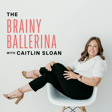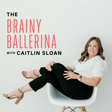
59. From Insecurity to Inspiration: Navigating the Comparison Game in Dance
In this week’s solo episode, I’m tackling a topic that comes up often for dancers: comparison.
I dive deep into why comparison is a natural human instinct - rooted in evolutionary survival - and how it’s especially amplified in the world of ballet, where mirrors, corrections, and casting are constant. Rather than trying to eliminate comparison, this episode is full of empowering tools to reframe it into a source of motivation, self-awareness, and growth.
Key “pointes” in this episode:
🩰Why comparison is more than just a bad habit, and why it's especially common among dancers
🩰A simple mindset shift that can make comparison less painful and more productive
🩰My advice on handling social media in a way that supports your growth
🩰Using your unique strengths to stand out in a competitive environment
🩰Practical tools (and journal prompts) to turn comparison into clarity and confidence
Blog Post: thebrainyballerina.com/blog/from-insecurity-to-inspiration-navigating-the-comparison-game-in-dance
Join the Conversation
Head to my Instagram @TheBrainyBallerina and join my channel “Career Guidance for Dancers” to participate in future episode polls and get exclusive career tips straight to your inbox.
Let’s connect!
My WEBSITE: thebrainyballerina.com
INSTAGRAM: instagram.com/thebrainyballerina
1-1 Career Mentoring: book your complimentary career call
Questions/comments? Email me at caitlin@thebrainyballerina.com

